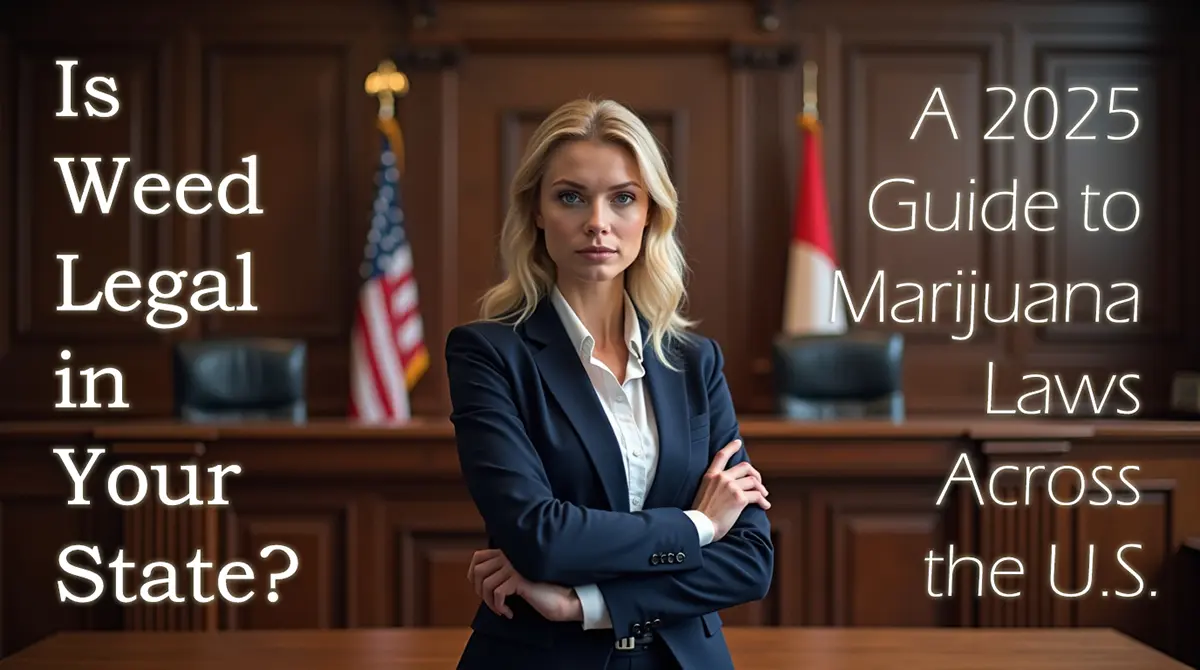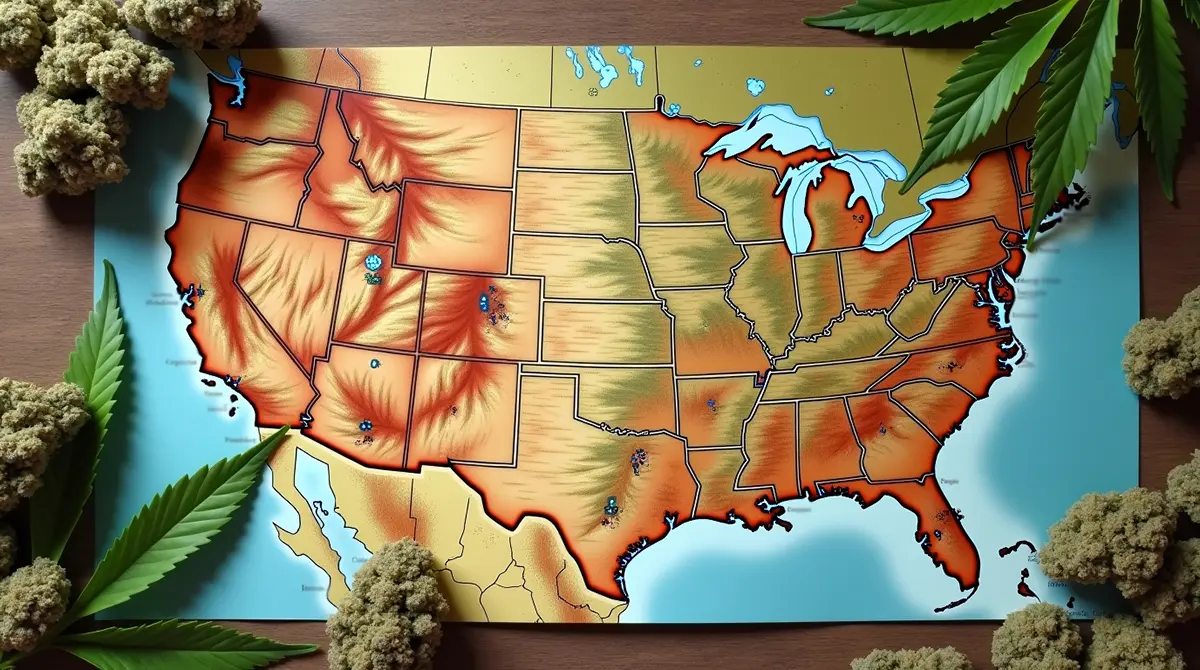Blog
Is Weed Legal in Your State? A 2025 Guide to Marijuana Laws Across the U.S.

Written and fact-checked by Dr. Dan Roden, MD, Cannabis Policy Researcher at Get Bud Online
Last updated: October 2025
Overview
Over the past decade, marijuana laws in the United States have shifted faster than almost any other area of public policy. Once banned nationwide, cannabis is now legal for medical or recreational use in most states. Yet laws still differ widely from one state to another.
This 2025 guide summarizes current cannabis legislation across the U.S., helping readers understand what is—and isn’t—permitted where they live. It draws on state regulatory updates, public-health data, and ongoing research into cannabis reform.
Whether you’re a patient exploring medical options, an adult user interested in state-approved products, or simply trying to stay informed, this article offers a reliable snapshot of America’s cannabis landscape.
Understanding Federal and State Law
At the federal level, marijuana remains classified as a Schedule I controlled substance under the Controlled Substances Act. This means it is technically illegal to possess, sell, or transport cannabis across state lines. However, since 2013, the federal government has largely deferred to states to regulate cannabis locally.
States have responded with a patchwork of laws:
- 24 states + Washington, D.C. now allow recreational (adult-use) marijuana.
- 38 states operate medical-marijuana programs.
- A handful maintain complete prohibition.
State-by-State Cannabis Laws (2025 Update)
Each state section below notes the current legal status of both recreational and medical cannabis, followed by a short context summary.
Florida
- Recreational use: ❌ Illegal
- Medical use: ✅ Legal with state-issued medical card
Florida legalized medical marijuana in 2016 (Amendment 2). Qualified patients can access products through licensed dispensaries for conditions such as chronic pain, PTSD, and epilepsy. Recreational possession remains prohibited, though legalization initiatives continue to appear on the ballot.
Floridians seeking federally compliant hemp alternatives—such as Delta-9 or CBD products derived from hemp—can find lab-tested, Farm-Bill-compliant options through trusted U.S. retailers like Get Bud Online.
Ohio
- Recreational use: ✅ Legal (since late 2023)
- Medical use: ✅ Legal (since 2016)
Ohio voters passed Issue 2, allowing adults 21+ to possess up to 2.5 ounces and grow up to six plants per person. Licensed recreational dispensaries are expanding statewide.
Ohio’s move signals how fast Midwest states are normalizing cannabis, while still encouraging responsible, state-regulated use.
Texas
- Recreational use: ❌ Illegal
- Medical use: ⚠️ Restricted (low-THC oil only)
Texas operates under the Compassionate Use Program, permitting certain patients to use low-THC (≤ 1%) oil. Smoking cannabis remains prohibited, and possession of small amounts can lead to criminal penalties.
Public opinion in Texas continues to lean toward reform, but legislative resistance keeps the state among the strictest in the U.S. Residents often turn to hemp-derived cannabinoids—such as compliant Delta-8 THC gummies—available through vetted online platforms like Get Bud Online.
Arizona
- Recreational use: ✅ Legal (since 2020)
- Medical use: ✅ Legal (since 2010)
Arizona has one of the most accessible programs in the Southwest. Adults 21+ can possess up to one ounce and cultivate up to six plants at home. Medical patients enjoy an established dispensary network and additional purchase allowances.
New York
- Recreational use: ✅ Legal (since 2021)
- Medical use: ✅ Legal (since 2014)
New York’s Office of Cannabis Management oversees one of the nation’s largest and most regulated frameworks. Adults 21+ can possess up to three ounces and grow up to six plants for personal use. Consumption is limited to areas where tobacco use is permitted.
The state’s emphasis on equity licensing has created opportunities for small operators while supporting community reinvestment programs.
Nevada
- Recreational use: ✅ Legal (since 2017)
- Medical use: ✅ Legal (since 2000)
Adults 21+ may purchase up to one ounce of cannabis flower or ⅛ ounce of cannabis concentrates. Nevada pioneered cannabis consumption lounges, providing safe, social environments for adult use—especially popular in Las Vegas.
As a tourism hub, Nevada continues to refine guidelines on safe consumption and transportation limits.
California
- Recreational use: ✅ Legal (since 2016)
- Medical use: ✅ Legal (since 1996)
California remains the benchmark for cannabis culture and regulation. Adults 21+ can possess up to one ounce and grow up to six plants. The state’s robust testing and licensing requirements have set national standards for safety and labeling.
While marijuana remains a major industry here, many U.S. consumers outside California legally access hemp-derived alternatives online through Get Bud Online, ensuring compliance with the 2018 Farm Bill.
Illinois
- Recreational use: ✅ Legal (since 2020)
- Medical use: ✅ Legal (since 2013)
Illinois became the first state to legalize recreational cannabis through the legislature rather than voter initiative. Adults 21+ can possess up to 30 grams of cannabis flower and five grams of concentrate. The state’s Social Equity Program helps communities most affected by prohibition participate in the new market.
Colorado
- Recreational use: ✅ Legal (since 2012)
- Medical use: ✅ Legal (since 2000)
As one of the earliest adopters, Colorado still leads in cannabis tourism, research, and safety testing. Adults 21+ can possess up to one ounce and grow up to six plants (three mature). The state has collected billions in tax revenue redirected toward public health and education.
Washington D.C.
- Recreational use: ✅ Legal (since 2014)
- Medical use: ✅ Legal
Adults 21+ can possess up to two ounces and grow six plants (three mature). However, retail sales remain restricted because Congress limits D.C.’s ability to regulate commercial markets. “Gifting” cannabis remains a common workaround inside the District.
Pennsylvania
- Recreational use: ❌ Illegal
- Medical use: ✅ Legal (since 2016)
Pennsylvania’s medical program allows certified patients to purchase cannabis for qualifying conditions. Possession of small amounts for personal use has been decriminalized in several cities, signaling potential future reform.
North Carolina
- Recreational use: ❌ Illegal
- Medical use: ⚠️ Pending legislation
While North Carolina remains one of the Southeast’s prohibition states, bipartisan proposals continue to surface. The legislature is considering a tightly regulated medical-marijuana bill focused on chronic pain and cancer treatment.
Virginia
- Recreational use: ✅ Legal (since 2021)
- Medical use: ✅ Legal (since 2020)
Virginia became the first Southern state to legalize adult-use cannabis. Adults 21+ may possess up to one ounce and grow up to four plants per household. Retail sales, however, remain pending final state regulations expected in 2026.
Minnesota
- Recreational use: ✅ Legal (since 2023)
- Medical use: ✅ Legal (since 2014)
Minnesota recently transitioned from a medical-only system to full adult use. Adults 21+ can possess up to two ounces and grow up to eight plants, with limits on the number of mature plants. Sales are expected to begin in 2025 after licensing is complete.
Other Notable States
| Category | States |
| Recreationally Legal | Alaska, Arizona, California, Colorado, Connecticut, Delaware, Illinois, Maine, Maryland, Massachusetts, Michigan, Minnesota, Missouri, Montana, Nevada, New Jersey, New Mexico, New York, Ohio, Oregon, Rhode Island, Vermont, Virginia, Washington, and D.C. |
| Medical Only | Arkansas, Florida, Hawaii, Louisiana, North Dakota, Oklahoma, Pennsylvania, Utah, West Virginia |
| Prohibition States | Idaho, Kansas, Nebraska, South Carolina, Texas |
Trends Shaping U.S. Cannabis Policy
- Public Support Rising – Recent national surveys show nearly 70 % of Americans favor recreational legalization.
- Economic Momentum – Cannabis sales now exceed $30 billion annually, generating significant state tax revenue.
- Social Equity Focus – Many states prioritize licensing for communities disproportionately affected by past prohibition.
- Federal Reform Debate – Congress continues to discuss rescheduling marijuana and creating banking protections for cannabis businesses.
Safe and Legal Alternatives Nationwide
Even in states where marijuana remains illegal, adults can explore federally lawful options made from hemp (≤ 0.3 % THC by dry weight). These products—like Delta-9 edibles, CBD oils, and HHC vapes—offer similar wellness or relaxation effects while remaining compliant under the 2018 Farm Bill.
Get Bud Online specializes in such hemp-derived alternatives, each batch third-party lab-tested for purity and potency. These products can be shipped discreetly across all 50 states for adults 21 and over.
(Note: Consumers should verify local regulations, as some states impose additional restrictions on hemp cannabinoids.)
Looking Ahead: The Future of Legalization
By 2030, experts expect a majority of U.S. states to have legalized recreational cannabis. Momentum is driven by bipartisan support, evidence of medical benefit, and public recognition that regulated systems outperform prohibition in safety and oversight.
Federal reforms under discussion include:
- Rescheduling or de-scheduling marijuana from Schedule I.
- Allowing interstate commerce between licensed producers.
- Creating uniform labeling and testing standards.
Until those changes occur, consumers must continue to follow their state’s specific laws and purchase only from licensed or verified legal sources.
How to Stay Informed
- Check state government websites regularly for new legislation or updates.
- Verify dispensary licensing before purchasing.
- Review lab certificates (COAs) for all hemp or cannabis products.
- Follow credible research organizations studying long-term health and safety effects.
Staying informed ensures compliance and personal safety in this rapidly evolving space.
References
(Publicly available government and policy resources used in preparing this article)
- National Conference of State Legislatures (NCSL). (2025, October 27). State Cannabis Legislation Database. Available at: https://www.ncsl.org/health/state-cannabis-legislation-database
- DEA.gov. (2025). The Controlled Substances Act. Available at: https://www.dea.gov/drug-information/csa
- CDC.gov. (2024, February 16). Cannabis Health Effects. Available at: https://www.cdc.gov/cannabis/health-effects/index.html
About the Author
Dr. Dan Roden, MD is a public-policy analyst and cannabis researcher with over 10 years of experience studying state and federal marijuana legislation. He serves as a research consultant for Get Bud Online, focusing on cannabis law compliance, hemp-product safety, and consumer education.
Disclaimer:
This article is for educational purposes only. Cannabis laws change frequently, and enforcement can vary by jurisdiction. Always verify the most current state regulations before purchasing, possessing, or consuming cannabis or hemp products.
Get Bud Online — Your Trusted Source for Legal Hemp Alternatives
Explore lab-tested, federally compliant products that meet the highest safety standards.


